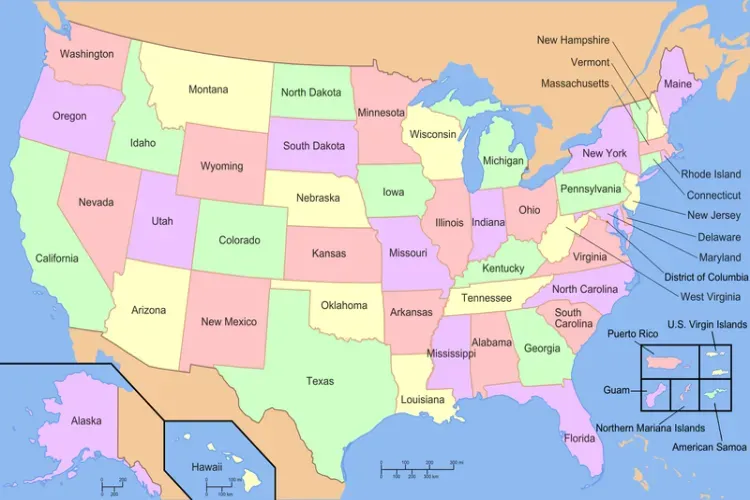Real estate reciprocity is important when a licensed real estate agent is moving to a new state and want to keep working in real estate? Check if there is . This rule lets you get a license in a new state more easily.
Our article will show you the types of reciprocity and how they work, so you can move forward without starting over. Ready to learn? Keep reading!
Key Takeaways
- Real estate license reciprocity lets agents use their existing license to work in a new state more easily, without redoing all courses and tests.
- There are different types of reciprocity: full, partial, mutual, limited, and no reciprocity. States like Alabama offer full reciprocity while others like Alaska have no reciprocity.
- Not all states accept licenses from elsewhere. For example, Kentucky has strict rules and is known as a turf state.
- License portability is different from reciprocity but also helps agents work in other states. Some states are cooperative or physical location states.
- Before moving your real estate career to another state, check that state’s rules on reciprocity or if they’re part of the few that require starting from scratch with licensing requirements.
What Real Estate License Reciprocity Means
Real estate license reciprocity means if you have a real estate license in one state, you can get a license in another state more easily. You don’t have to start all over with learning and tests.
Many states let people skip the usual classes and only learn what’s different about that new place. This is great because it saves time and effort.
Full reciprocity states like Alabama make life simple for agents moving there. They just need their current good standing status from any US state, skipping repeat courses. But not every state is this easygoing – some require everyone to retake classes or only offer shortcuts to folks from certain places.
The trick is knowing which rules apply where before making a move.
Types of Real Estate License Reciprocity
In the real estate world, license swapping between states isn’t just one flavor. It’s more like a menu with options ranging from full to no swapping at all. Each type sets the rules on how an agent can move their license from one state to another without redoing all their exams or classes.
This makes it easier for agents who want to work in new places but still keep their hard-earned credentials.
Full real estate reciprocity means if you have a real estate license in one US state, some other states let you get their license too. You don’t have to take the same courses again.
States like Alabama, Colorado, Maine, Mississippi, and Virginia are good examples. They say if your license is active and in good shape somewhere else, come on over! No need to hit the books again for what you already know.
This makes life easier for real estate agents who move or want to work in new places. Imagine packing up your things and moving to another state without worrying about more exams or classes.
That’s what full reciprocity offers – a smoother ride into new markets with your trusted real estate skills ready to go.
Partial real estate reciprocity deals with states like Arkansas. They give real estate agents from certain places a chance to work there without starting over. States set their own rules for this kind of deal.
Some might ask you to take part of the test again, while others just want to see that your license is still good.
Agents need to check the details before moving. Each state has its own list of friends—states they have this deal with—and what they expect from you. Like, some states may want proof that you really know how to sell houses there, not just anywhere.
This makes moving and keeping your job a bit easier but still needs some homework on your part.
Mutual real estate reciprocity makes it easy for agents to move their license between states. They don’t have to start all over again. It’s like a shortcut for people who already have an active real estate license elsewhere.
This means they can skip some steps and get right into selling houses in a new state.
States that agree on mutual reciprocity let agents swap licenses without the hassle of doing everything from square one. Agents just need to show they are good at what they do where they come from.
Then, getting set up in the new place is much simpler. This helps agents spread their wings and work in different places without redoing exams or classes they’ve already passed.
In the world of real estate, states with limited reciprocity only play nice with a few other places. Imagine you’re holding a license in one state but dreaming of selling houses in another.
With limited reciprocity, your dreams hit a small bump. You might need to take extra courses or pass part of the state exam again to make your license work there.
Each state sets its own rules for this game. Think of it as needing a special key to unlock work opportunities elsewhere. For marketers, knowing these rules can help guide where and how they promote property listings or find jobs across borders.
It’s all about matching the right people with the right places—keeping an eye on those pesky requirements makes that task much easier.
Some states are tough cookies. They do not play the reciprocity game at all. Folks moving to Alaska, Arizona, or California from another state can’t just swap their license. No shortcuts here.
These states ask you to hit the books again and pass their own real estate courses and exams. It’s like starting from square one.
This means more studying, more tests, and yes—more fees! For real estate pros dreaming of sunny California beaches or the wilds of Alaska, it’s a bit of a bummer. But rules are rules, and for these states, it’s all about keeping things tight and right under their own roofs.
So if you’re planning a move, better check those requirements early—and maybe start brushing up on that local real estate law!
Real Estate Reciprocity Table
Here is a table showing the real estate license reciprocity status for each U.S. state and territory:
| State/Territory | Reciprocity Status |
|---|---|
| Alabama | Full reciprocity with all states |
| Alaska | Full reciprocity with all states |
| Arizona | No reciprocity |
| Arkansas | Partial reciprocity with AL, CO, FL, GA, IA, KS, LA, MS, NE, NY, OH, OK, PA, SD, WA, WV |
| California | No reciprocity |
| Colorado | Full reciprocity with all states |
| Connecticut | Partial reciprocity with AL, CO, FL, GA, IL, IN, MA, MS, NE, NY, OH, OK, RI |
| Delaware | Full reciprocity with all states |
| District of Columbia | Partial reciprocity with AL, DE, GA, ID, LA, MS, MT, NE, NY, ND, PA, SC, TN, VT, WA, WV, WY |
| Florida | Partial reciprocity with AL, AR, CT, GA, IL, MS, NE, RI |
| Georgia | Full reciprocity with all states |
| Guam | No reciprocity |
| Hawaii | No reciprocity, but may waive some requirements |
| Idaho | Full reciprocity with all states |
| Illinois | Partial reciprocity with CO, CT, FL, GA, IN, IA, NE, SD, WI |
| Indiana | No reciprocity |
| Iowa | Partial reciprocity with AR, GA, LA, MA, MN, MS, ND |
| Kansas | Full reciprocity with all states |
| Kentucky | Partial reciprocity with FL, IL, OH, TN, WV |
| Louisiana | Partial reciprocity with AL, AR, CO, GA, IA, MS, NM, OK, PA |
| Maine | Full reciprocity with all states |
| Maryland | Partial reciprocity with OK, PA |
| Massachusetts | Partial reciprocity with AL, AK, CO, CT, DE, GA, IA, KS, KY, ME, MS, MO, NE, NH, NM, NY, NC, ND, OH, OK, RI, SC, VT, VA, WV, WI |
| Michigan | No reciprocity |
| Minnesota | Partial reciprocity with IA, ND, SD, WI |
| Mississippi | Full reciprocity with all states |
| Missouri | Full reciprocity with all states |
| Montana | Partial reciprocity with Alberta (Canada), CO, GA, ID, IA, NE, NM, ND, OR, SD, TN, UT, WY |
| Nebraska | Full reciprocity with all states |
| Nevada | No reciprocity, but may waive education requirements for some states |
| New Hampshire | Partial reciprocity with MA, ME, VT |
| New Jersey | No reciprocity |
| New Mexico | Partial reciprocity with CO, LA, OK |
| New York | Partial reciprocity with CT, MA, NJ, PA |
| North Carolina | Full reciprocity with all states |
| North Dakota | Partial reciprocity with IA, MN, SD, WI |
| Ohio | Full reciprocity with all states |
| Oklahoma | Partial reciprocity with AL, AR, CO, GA, KS, LA, MS, NE, NM, TX |
| Oregon | No reciprocity |
| Pennsylvania | Partial reciprocity with CT, DE, MA, MD, NJ, NY, OH, RI, VA, WV |
| Puerto Rico | No reciprocity |
| Rhode Island | Partial reciprocity with CT, FL, MA |
| South Carolina | Full reciprocity with all states |
| South Dakota | No reciprocity |
| Tennessee | Full reciprocity with all states |
| Texas | No reciprocity |
| Utah | Partial reciprocity with GA, MS, Alberta (Canada) |
| Vermont | No reciprocity, but may waive exam requirements |
| Virginia | Full reciprocity with all states |
| Washington | Full reciprocity with all states |
| West Virginia | Partial reciprocity with FL, KY, OH |
| Wisconsin | Partial reciprocity with IL, IN, IA, MN, ND |
| Wyoming | No reciprocity |
| U.S. Virgin Islands | No reciprocity |
This table is based on the most current reciprocity information from state real estate commissions and regulatory bodies. However, reciprocity agreements can change, so it’s advisable to verify the latest status with the specific state(s) involved when seeking a reciprocal license transfer.
Real Estate License Portability
So, you got your real estate license and think you’re all set, right? But wait—what if you want to work in a different state? Well, that’s where real estate license portability comes into play.
It’s like having a magic key that could open doors to new places for your career. Yet, not all keys fit every lock. Some states are friendly neighbors and welcome you with open arms.
Others—not so much! They might ask you to take more tests or meet extra rules. So before packing your bags, make sure to check how portable your license really is—it could save you a surprise or two down the road!
Cooperative State
In a cooperative state, real estate agents can work across state lines. This is great for marketers because it gives them more freedom. They do not need to worry about strict rules of where they can sell houses.
This means if someone has a license in one state, they can easily help clients in another cooperative state.
This setup is handy for people looking to buy or sell homes in different places. Marketers can reach out to more folks without getting stuck with heavy paperwork or extra exams. It makes the whole process smoother and lets agents focus on helping their clients find their dream homes.
Physical Location State
A physical location state strictly needs real estate agents to work within its borders. This means, if an agent holds a license in another place but wants to sell houses here, they face more steps.
They must get a local license by passing the state portion of the real estate exam again. Alaska is one such spot where this rule applies. Agents from outside who wish to work in Alaska need to sit down and pass that test first.
Many states prefer working with neighbors—meaning they accept licenses from close-by states. Yet, for those coming from far away or with different rules, getting started isn’t as easy.
It’s like starting over: learning new laws, taking exams, and waiting for approval all over again. But it makes sure everyone selling homes knows what they’re talking about locally—which keeps buyers safe too.
Turf State
In turf states like Kentucky and Utah, the rules for real estate license holders from other places are strict. Here, they don’t allow people with outside licenses to do any real estate business inside their borders.
This means if someone wants to work in these states, they can’t just bring their license from somewhere else and start working. They need to go through the process of getting a new license in that state.
These states have this rule because they want to make sure all the real estate professionals working there really understand the local laws and market. It’s all about keeping standards high and making sure clients get the best service.
So, for marketers looking at real estate opportunities in turf states, it’s crucial to know these restrictions upfront. Working here might mean extra steps, but it also means being part of a closely watched market where quality counts a lot.
Real Estate License Reciprocity Across States
Each state has its own rules about swapping a real estate license from one place to another. This makes moving or working in new places simpler for agents. For more details, keep reading!
Alabama has a great deal for real estate folks from other states. If you already sell houses somewhere else in the US, Alabama lets you swap your license for one of theirs without going back to school.
Just make sure your current license is healthy and active. This way, moving your career to Alabama could be as easy as pie.
You just need to show that your license from the other place is still good. Once they see it’s all clear, they give you a new Alabama real estate badge to wear. No extra tests or classes needed.
So, if you’re thinking about selling homes under the warm Alabama sun, this state rolls out the welcome mat for you.
Alaska stands out because it does not offer real estate license reciprocity with any other state. This means if you have a license from another place, you can’t just start working in Alaska.
You’d need to go through the whole process of getting an Alaskan real estate license from scratch. So, folks holding a current real estate license elsewhere would still face the full steps: applying, studying for, and passing the Alaska-specific exam.
Before trying to work in Alaska’s real estate market, make sure your existing license is active and looks good on paper. Without this, even starting the journey towards an Alaskan broker or salesperson permit isn’t possible.
Getting into Alaska’s real estate scene might be more challenging than in states that play nice with reciprocity agreements but knowing what’s needed ahead of time can save lots of headaches later.
California’s new law makes things easier for military families. Now, veterans and their partners get a special pass to work in real estate while they check off the state’s list of needs.
This help lasts for at least one year. It means if you have a real estate license from another place and are part of a military family, California rolls out the welcome mat for you.
This move puts a spotlight on how states can vary with their rules about who gets to sell houses where. For those keeping an eye open, knowing this could be key in making smart moves in your career or helping others do the same.
So, if someone holds an active license elsewhere but dreams of working under the sunny skies of California – especially if they’re serving our country or married to someone who is – there’s good news waiting!
Florida is a great place for real estate agents from certain states. People with a real estate license can move their license to Florida. They don’t have to take the licensing exam again.
This means they save time and start working faster.
This state has an agreement with others. It lets people who sell homes use their license in Florida too. Agents just need to make sure their license is active and in good shape. Then, they can enjoy selling houses in sunny Florida without extra tests or long waits.
Kentucky plays hard to get with its real estate license rules. Only a few states can shake hands with Kentucky on this. They don’t agree much with others on letting outside real estate agents come in and do their thing.
So, if you’re holding an active license somewhere nice and think, “Hey, I’ll try Kentucky,” check the list first. The Kentucky Real Estate Commission keeps this list ready.
Also, for those who’ve set their sights on Kentucky’s green pastures, make sure your paperwork shines. Your current license must look good – active and trouble-free. This is key before tapping into Kentucky’s market.
It’s a bit like getting past a tough bouncer at a club – your ID better be right! So it goes without saying (but we’ll say it anyway), always hit up the Kentucky Real Estate Commission for the latest dance moves.
ahem, I mean rules.
Real Estate License Portability Across States
Ready to take your real estate career on the road? Real Estate License Portability is all about moving that valuable license of yours from one state to another without a hitch. Think of it as your golden ticket to stretch those real estate muscles far and wide.
So, if you’re itching for a change in scenery or aiming to conquer new markets, keep reading.
Alabama: Cooperative State
Alabama stands out as a welcoming spot for real estate pros from other states. This state plays nice with folks who already have a real estate ticket somewhere else in the U.S. That’s right, they offer full license friendliness.
If you’re looking to spread your wings into Alabama without the headache of new tests or jumping through hoops, you’re in luck.
The cooperative nature here means you can use your active license from another place and get right to work. It’s like moving your office to a new state without losing a day. Alabama doesn’t make you sit exams all over again if your paperwork is all good elsewhere.
So, pack up those broker dreams and head on down—Alabama’s ready for you.
Alaska: Physical Location State
Alaska stands out because it does not let real estate agents from other places just come and work as if they were at home. Here, you must physically be in the state to do your real estate job.
This means no cutting corners or using licenses from elsewhere. You need to get one right there in Alaska.
For marketers looking to dive into Alaska’s unique market, this rule is key. It ensures that all real estate pros operate on the same playing field, directly within the state’s borders.
Without any shortcuts, everyone starts from square one, guaranteeing fairness across the board.
Kentucky: Turf State
Kentucky stands its ground with real estate license portability. This means, if you hold a license somewhere else and want to work in Kentucky, it’s not simple. The state has its own rules for how someone can bring their license over.
You can’t just walk in and start selling homes.
For those with eyes on Kentucky’s market, there’s some homework to do first. The state offers limited agreements with certain other places. This means they might accept your out-of-state license but expect you to jump through a few hoops first.
You’ll need to check what Kentucky requires and maybe pass a test or two.
How Reciprocity Affects Real Estate Professionals
Reciprocity changes the game for real estate pros. It opens doors between states, letting agents and brokers spread their wings without starting over. Say you have a license in one state and move to another with reciprocity rules that play nice.
You can skip the redo on courses and dive straight into what’s unique about your new home base. This means less downtime learning norms you already know and more time doing what you do best: selling homes.
For marketers in real estate, this is huge. It boosts the number of places you can work without tying you down. Think bigger audience, wider network, more chances to close deals. And if your state has an agreement with many others, that’s even better! Your career isn’t stuck within four walls or state lines—it can grow as far as your ambition takes it.
Just make sure your current license is shiny clean before making moves; nobody likes nasty surprises during transfers!
How to Transfer Your Real Estate License
Moving your real estate license to another state starts with checking if the new state offers reciprocity. This means they accept licenses from some other places. You need to get a certified license history from where you have your current license.
This paper shows you have an active and good standing license.
Next, see if you must take a part of the exam again in the new state. Some states might not make you do this if their rules are like your old state’s rules. Fill out an application for the new place and include your certified history and any exam results, if needed.
Remember to pay any fees that come with this process. It’s how you show another state that yes, I can work here too!
Conclusion
So, you see, the world of buying and selling houses has rules. Different states play by different rules for who can sell houses there. Some states are like best friends – they make it easy for house sellers from other places to join them.
Others are more like the kid in class who doesn’t share his toys; they want you to learn their way first. If you’re a house seller looking to move, know this: check the new state’s rulebook.
Each state’s club has its own secret handshake (or license rules), and knowing them makes joining much smoother. This knowledge is your key to open new doors — literally!





Leave a Reply